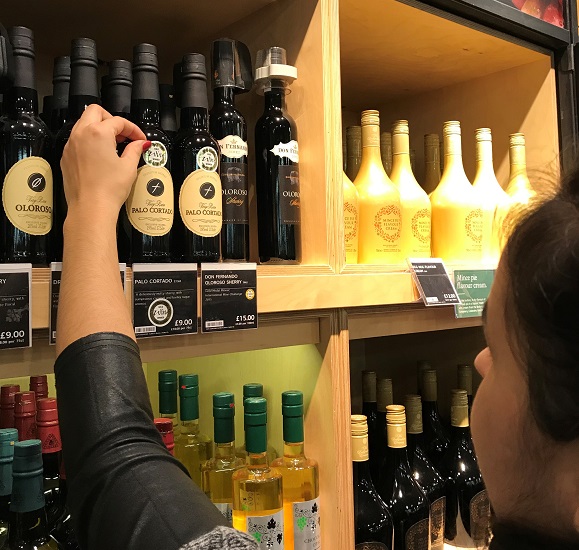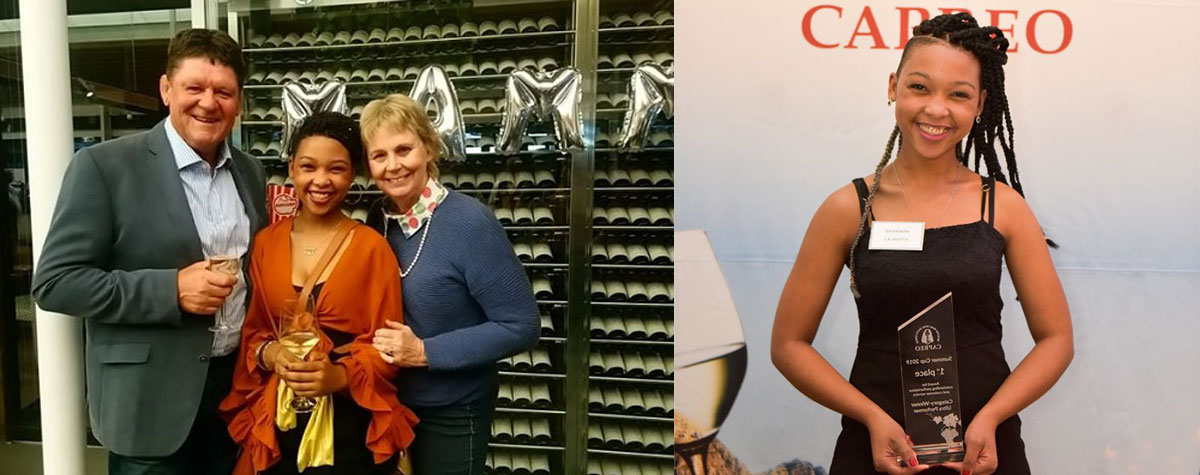Then she was given the news that she had gained an IWC bursary to continue her wine studies and go for a WSET Level 4 Diploma. “I feel so blessed and out-of-my-mind grateful that the International Wine Challenge will fund me with £1,000 for the course,” she told Canopy. “For me and where I come from, both of these opportunities are beyond my wildest dreams. I will always and forever be grateful. Thank you.”
It’s not just us she’s thanking – it’s everyone who sends wines to the International Wine Challenge (IWC).
All the IWC entrants are helping to lift disadvantaged youngsters like Shannon – and her five-year-old daughter – out of poverty.
Five years ago, single-mum Shannon was living with her extended family – 13 people in total – in a “two-apartment shack” before your IWC entry helped fund her WSET Level 2 course, which led to employment at La Motte Wine Estate in the Franschhoek Valley (a regular IWC Silver and Bronze medal winner which struck Gold with its La Motte Pierneef Shiraz Viognier 2011).
Now Shannon has her own apartment, a career and is saving for a car.
Shannon is one of 80 young people from townships who have had their WSET Level 2 course paid for by the IWC over the past two years. Twenty have also been given IWC bursaries so they can progress to Level 3 or the Diploma.
Cathy Marston, the local WSET programme provider, told Canopy: “I really hope you can give your readers a good understanding of just what a difference this support does for people in South Africa. According to local statistics, when you uplift one person in South Africa and get them into stable employment, you actually have a positive financial impact on a further four people. So you can see how much good can be achieved by your sponsorship.
“It isn’t always a given that employers pay for employee’s studies and La Motte’s generosity in paying for Shannon is, unfortunately, not always the norm. Our Level 2 qualification, because of the exchange rate etc, can easily be the equivalent of two months’ gross salary for many of our students, so you can imagine how difficult it is for them to do levels 3 and 4 without your help!
'These qualifications change people’s lives'“Why do they try so hard to get these qualifications? Because they literally change people’s lives. It enables them to get a good job in South Africa or elsewhere, to get a job on the cruise ships, to become a sommelier in Dubai, to work in hotels in the US. It enables people who have left school with no qualifications whatsoever to enter the job market at a much higher level than they could have imagined – to become professional-status people, to qualify for credit cards, be able to buy a car, to help build their parents a house. And in addition, because many of the people the IWC supports are people of colour, by upskilling these students, you are helping the transformation process of our industry which is sorely needed.”
The money is raised through the donation of unopened bottles of wine sent into the International Wine Challenge. Any leftover wine is used to raise funds for charities, such as the UK-based Dame Hilary Cropper Foundation which supports South Africa’s Pinotage Youth Development Academy. The PYDA was set up in Stellenbosch in 2013 to help young people get jobs within the wine and wine tourism industry. As part of the year-long course, students are offered the chance to sit WSET exams.
The IWC funded 30 WSET Level 2 students last year and will be paying for a further 50 this year.

Shannon’s story in her own words
“I went to the library one day in 2015. I heard someone asking for an application form, so I asked for one as well, having no idea what it was about.The only words I remember reading on the form were “free” and “study”. The only wine related question was: “Do you know someone that works on a wine farm?”
At the time, my grandfather was working on a farm in Franschhoek.
You have to undergo a few processes to be part of the Pinotage Youth Development Academy. The biggest challenge for me was having a six-month-old baby.
I had to decide whether to work as a cashier at a supermarket for immediate payment or further my studies.
I chose the 12-month course at the PYDA, and gained a WSET Level 2 during my studies.
At the Academy you get assigned a life coach who really encouraged me to drive myself, motivate myself and put myself out, so I did!
I took on the opportunity to work at the Hilton Hotel Cape Town. I graduated from my wine studies one Friday in 2016 and moved that same weekend to Cape Town to work as a chef’s apprentice, starting on the Monday.
There, I earned the opportunity to study at the HTA Culinary School in Johannesburg, taking my very first flight!
I have been working at La Motte since December 2017 and completed my WSET Level 3 with their financial support.
None of the above would have been possible without initiatives like the IWC that choose to sponsor the Academy, so that they can ignite young individuals like myself to strive beyond all odds and achieve our dreams and realise our talents.
After all, the Academy’s motto is: ‘Launching talent to make a difference’.
I come from a previously financially disadvantaged family which can easily shatter your dreams. I love my family more than life itself so I couldn’t allow my dreams to be clouded.
My grandmother is happier that I’m not part of South Africa’s unemployment statistics than the fact that I work with wine, but she is happy and that’s most important.
My daughter is now five years old. I missed out on a lot when she was growing up. However, looking back, I am more able to fulfil her needs now: I’m educated and can be a lot more of a mother to her.
Without sponsors that enable the Academy to educate myself and so many others, I can’t even imagine where I would be and what my life would have been like today.
Today, I am fully employed, I saved up enough money to build a more stable home for my family. We went from sharing a two-apartment shack for 13 people to me moving out into an apartment with my daughter. My grandmother is happy, my family is stable. I still get super-excited calling a room my own, a TV my own and soon a car of my own.
I am not ready to settle down yet, I have so much room for growth in me, so much more to tell younger individuals.
I want my story to be seen as a motivational letter for future and current sponsors. Money cannot buy happiness but it can invest in someone’s dream.
I still wake up every day feeling I need to plough back, I still owe so many people so much. For investing in me when I didn’t even believe in myself. Despite the fact that my family does not like alcohol, they love me and support my dreams.
I owe the Academy and every individual that had an influence on my career path my forever gratitude.”
Entries for the International Wine Challenge 2020 close on October 6. Click here to enter and help the next Shannon Fortuin.

3 more reasons to enter IWC 2020
1. It’s a simple way to boost salesResearch conducted by IWC in conjunction with two UK supermarkets found that IWC medal stickers boosted sales by up to 700%. During a four-week period, the IWC’s Gold, Silver, Bronze and Commended stickers were applied to more than 100 award-winning wines carried by M&S and Co-op. The results were compared with control stores of a similar size, location, range, and shopper demographics.
The results showed a strong customer bias in favour of the stickers. Sales of Co-op’s Gold medal winners grew by 200% where the stickers were applied, whilst the retailer’s IWC Great Value winner saw an increase of 476%. The overall increase across all stickers when combined was 24.1%.
M&S saw a 117.3% jump in sales of wine with Gold stickers, while one Silver medal winner increased sales by an incredible 700% during the period.
IWC co-chair Helen McGinn explained: “An IWC medal is a really easy way just to signpost and help consumers make a decision when it comes to buying.”
Full story here.
2. It’s a cost-effective way to market and benchmark your wines
In a glass cabinet inside the wine shop and tasting room at Camel Valley, one of the UK’s leading producers, there’s an impressive display of IWC trophies and medals. Winemaker Sam Lindo says entering the International Wine Challenge is their key marketing tool. “That’s it, that’s all we do,” he said. “The number one reason we enter is, if you have success, the Wine Challenge will market your wines better than any other competition, that’s for sure. We also use it to benchmark our wines to see where we are with the quality of the wine, especially with our sparkling wines.
“It’s great to get that independent feedback, and it’s a really cost-effective way of doing that.”
Full story here.
3. It’s a great way to raise your global profile
The Domaine des Tourelles Red 2014 from Lebanon was named IWC Great Value Champion Red in 2018. Afterwards, winemaker Faouzi Issa told us: “We are increasing our production to meet the growing demand from our export markets.”
Full story here.
Entries for the International Wine Challenge 2020 close on October 6. Click here to enter.
Our man in South Africa is also helping disadvantaged youngsters
The IWC’s ambassador in South Africa, Neil Tabraham, is also doing his bit to improve inequality in the South African wine industry.Sommeliers Academy, a Cape Town-based company run by Neil and Jean-Vincent Ridon, has helped 94 students, from previously disadvantaged backgrounds, pass their exams to become qualified sommeliers.
Neil, an ASI certified sommelier, commented: “This is a fantastic outcome for students in unique and often difficult circumstances, despite complications thrown at us by the Covid-19 pandemic. Much of the success can be attributed to paying extra attention to soft skills to help build self-confidence and presentation skills in the workplace. Most of the students were provided with work placements to practise their skills during the programme, with many already moving into full-time positions as their employers recognise their talents. We are immensely proud to have been involved in changing people’s lives, but we must not detract from the hard work and effort from the students to better their chances in a highly competitive employment environment.”
Funding for this initiative came from the South African Department of Tourism.











.png)









